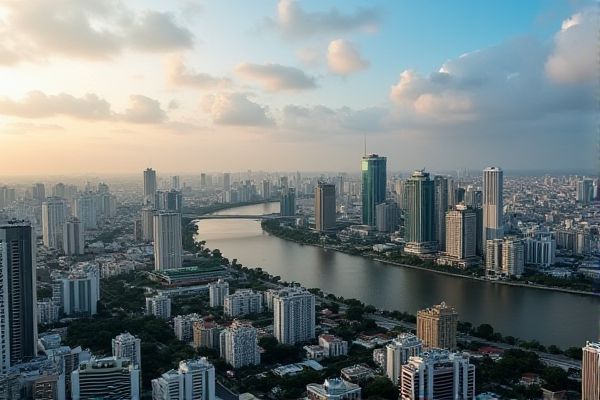
Moving to Thailand checklist: Visa requirements and application process. Cost of living comparison. Affordable health insurance options. Reliable moving and shipping services. Electrical system and adapter needs. Local cultural etiquette. Must-have language basics. Best banking options. Education options for children. Popular expat communities.
Visa requirements and application process
To move to Thailand, you need to obtain the appropriate visa, such as a Non-Immigrant B Visa for work, which requires a passport valid for at least six months, a completed visa application form, a passport-sized picture, and proof of sufficient financial means. Different visa categories, such as F, ED, EX, and O, have specific requirements. Some categories may necessitate additional documents like a work permit or proof of employment. For a comprehensive guide, you can visit the Checklist Before Moving to Thailand from April International.
Cost of living comparison
The cost of living in Thailand is significantly lower than in the United States, with Thailand being 64% less expensive. For example, the average monthly cost for one person in Thailand is $876, compared to $2,454 in the US, and rent for a one-person apartment averages $377 in Thailand versus $1,565 in the US. For more detailed information, visit the Living Cost website, which provides comprehensive insights into the financial benefits of residing in Thailand compared to the United States.
Affordable health insurance options
For affordable health insurance in Thailand, expats can consider private health insurance plans, as there are no longer health insurance requirements for entry, but having coverage is still essential; options include plans from providers like Pacific Cross, Cigna Global, and IMG Global, which offer various levels of coverage and benefits. For more detailed insights on moving to Thailand and finding suitable insurance plans, visit the International Citizens website.
Reliable moving and shipping services
For reliable moving and shipping services to or from Thailand, consider top companies like Allied Thailand, Thai Movers, Santa Fe Relocation, and Asian Tigers. These companies offer comprehensive services, including packing, transportation, customs clearance, and delivery, with global networks and professional staff to ensure safe and efficient relocation. If you're interested in exploring more about these options, visit the The Thaiger for detailed information on the top international moving companies in Thailand.
Electrical system and adapter needs
In Thailand, you will need a travel adaptor to fit into the country's plug types A, B, C, or occasionally O, and possibly a voltage converter or transformer if your appliances are not dual voltage, as Thailand operates on 230V and 50Hz. For more detailed information on this topic, you can visit the Electrical Safety First website, which provides comprehensive guidance to ensure safety and compatibility when traveling with electrical devices.
Local cultural etiquette
When moving to Thailand, it is crucial to understand local cultural etiquette, including greeting with a wai, removing shoes before entering homes or temples, dressing modestly, using your right hand for interactions, and showing respect for monks and the royal family. Navigating these customs can significantly enhance your experience, as explained by Luma Health. Additionally, avoid touching people's heads, pointing your feet at Buddha images, and displaying public affection to show proper respect and understanding of the culture.
Must-have language basics
To move to Thailand smoothly, it is essential to learn basic Thai phrases such as greetings (e.g., "Sawasdee" for hello), expressions of gratitude (e.g., "Khob khun" for thank you), and basic questions (e.g., "Sabai dee mai?" for how are you?). Knowing phrases for navigation, ordering food, and handling emergency situations can also greatly enhance your experience. For a more comprehensive guide, visiting the JP Boxing Gym website can be extremely beneficial, offering insights into essential Thai words and phrases for travelers in Thailand.
Best banking options
For expats in Thailand, some of the best banking options include Bangkok Bank, Kasikorn Bank, and Siam Commercial Bank. These banks provide extensive branch networks and user-friendly online and mobile banking services. They also offer tailored financial products specifically for expatriates, featuring multi-currency accounts and competitive exchange rates. For more detailed information, you can visit the Best Bank in Thailand to explore further insights and recommendations.
Education options for children
In Thailand, expat families have the option to enroll their children in numerous international schools, which are private institutions offering a range of curricula including British, American, and IB. These schools emphasize multicultural education, providing high-quality facilities and pathways to global universities. With educational programs catering to students from kindergarten to Grade 12, these institutions often require the learning of at least two languages, with English serving as the primary language of instruction. For more information, [Expatica](https://www.expatica.com/th/education/children/international-school-thailand-2172871/) provides useful insights into the international school system in Thailand.
Popular expat communities
Thailand is home to vibrant expat communities concentrated in bustling locations such as Bangkok, Chiang Mai, Pattaya, Phuket, and picturesque islands like Koh Samui and Koh Tao. These areas attract individuals from the UK, USA, Australia, Japan, and India, largely due to Thailand’s appealingly easy way of life and affordable cost of living. Popular expatriate neighborhoods in Bangkok, including Ekkamai, Sathorn, Thong Lo, and Silom, are particularly favored for their abundant amenities and lifestyle options. Cities like Phuket, Pattaya, and Hua Hin also beckon with their unique charms, although Bangkok remains a vibrant and economically strong environment. While Bangkok is recognized for its vibrant culture, it is also noted for being one of the more expensive areas to reside within the country.
